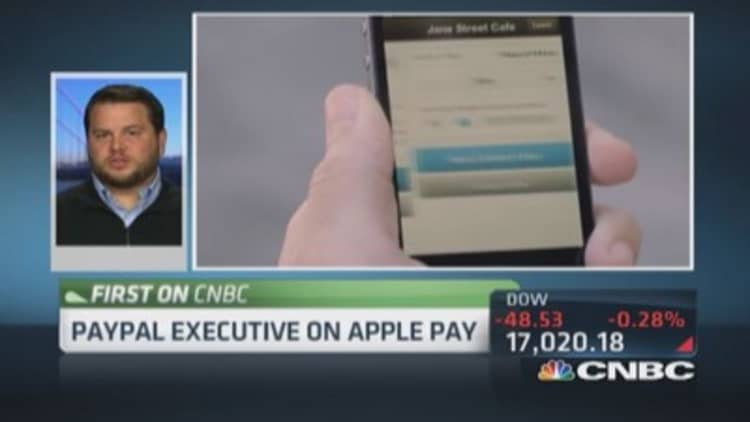Apple's new payment system hopes to change the way people make purchases both in stores and in apps, and that could become a big problem for the Web's biggest digital payment network, PayPal.
In addition to allowing people to pay in stores, Apple Pay will also let owners of the newest iPhones buy things within participating apps by using the credit or debit card they have on file with iTunes or the App Store.
Read More One step for Apple, one leap for mobile payments
This means they don't have to go through the annoying process of typing in payment information on small screens. Here are a few main reasons why the success of this product could damage PayPal in the long run:
1. Apple published an initial list of six "highly recommended" payments partners, including Stripe and First Data, that can process Apple Pay purchases for app publishers. Guess who's not on the list? Braintree, which happens to be PayPal's new payments processing unit for mobile apps.
More from Re/code:
Rivals react to Apple's new smartwatch
Brad Garlinghouse out as CEO of Hightail
Will Farrell to play video games for cancer charities on Twitch
Braintree later announced it'll help apps that run on its platform integrate with Apple Pay. How would that work? Basically, an app merchant using Braintree for payments could use it to process Apple Pay. That could mean a consumer could see both an Apple Pay button and a PayPal button when he or she wants to buy something. In either case, PayPal (via Braintree) will get paid something, but typically won't earn as much profit if the consumer clicks the Apple Pay button.
2. PayPal's Braintree owns Venmo, a consumer app that allows people to send money to each other. Consumers who have Venmo or PayPal's app can use PayPal's "one-touch" payments system to pay within an app. But that means signing up for Venmo or PayPal and downloading one of the apps. Compare that to Apple Pay, which doesn't require new sign-ups or downloads.
Read MoreIs ApplePay a bitcoin killer?
In an interview with Re/code, Braintree CEO Bill Ready made the case that people sign up for PayPal and Venmo for other reasons, such as to make purchases on eBay or send money to friends, not just to make one-touch payments. He also made the case that the one-touch button works on other mobile operating systems, such as Android.

Valid points. But it's reasonable to believe that as more iPhone users use Apple Pay to buy stuff in apps, one subset of potential new PayPal or Venmo customers will have one less reason to download those apps.
Read MoreApple Watch design: 'damn good' or 'bulky'?
Of course, an app maker could also allow for both Apple Pay and PayPal buttons to make it that much easier to buy. Apple wants the relationship with the customer. So do PayPal and Venmo. On Apple's devices, who would you bet on?
3. PayPal is now battling both Apple and Google for real estate on the checkout pages of mobile apps. PayPal has history on its side, but Apple and Google arguably have greater affection from consumers. If payment buttons from Apple and Google proliferate, PayPal's button suffers. PayPal and Braintree see their button as a way to convince app makers to use their system. But that system has lost its unique place within the world of app payments with Apple Pay coming into the picture.
4. PayPal generally makes more money when customers link their bank account directly to PayPal. With fewer middlemen, PayPal makes more profit from each transaction. PayPal's Braintree unit said it will also process Apple Pay purchases should a merchant want that option (see Point 1 above). PayPal still wins, right? Not exactly. It will still get some processing or related payments fees, since Braintree (which it owns) is working the back end of that purchase. But they're earning less profit since Apple Pay is linked only to a person's credit or debit card, not his or her bank.
When it comes to e-commerce, Apple Pay can have an impact on PayPal just focusing on app payments as it is now. If it extends Apple Pay into the mobile Web, things could get even worse.
—By Jason Del Rey, Re/code.net.
CNBC's parent NBCUniversal is an investor in Re/code's parent Revere Digital, and the companies have a content-sharing arrangement.

